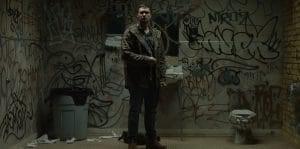
The “one-room pressure cooker” — a movie set almost entirely in a single location — is a filmic genre unto itself. Think of the big-time directors who used this setup to create career-making first features: Sidney Lumet (12 Angry Men), Quentin Tarantino (Reservoir Dogs) and Roman Polanski (Repulsion), to name a few. Or veteran director Alfred Hitchcock (Rope, Rear Window), who employed it well into his mature years. For performers, it’s an opportunity to act up a storm, and the insistent spareness of this format forces directors and writers put a white-hot focus on character development. It has the potential tobe the canvas on which a masterpiece is painted, but it’s also a tricky genre to get right. Essentially, it’s a filmed play, and it takes a fair amount of sleight of hand to keep such a stripped-down engine from overheating before it’s time to fade to black.

“…in a standoff with the cops as he hides out in a sleazy bathroom at a freeway rest stop.”
Except for some dreamy exterior flashback sequences, In This Gray Place sticks to the indie filmmaker’s credo of keeping the logistics as simple as possible. It’s a one-roomer about a holdup man, Aaron (Aleksander Ristic), in a standoff with the cops as he hides out in a sleazy bathroom at a freeway rest stop. During his hours-long occupation, the movie occasionally cuts to exterior shots of the stranded holdup man with his girlfriend, Laura (Angela Nordeng), as they bask in the unspoiled countryside. Laura, in voiceover, occasionally recites cringe-worthy poetic monologues, which add little to the story and clash with the otherwise gritty tone. We learn how Aaron got into this predicament through numerous cell phone calls and texts he makes — his phone holds a charge for an amazingly long time — and flashbacks to the pawn shop robbery that prompted him to go on the lam. He’s wounded, surrounded by cops and without a prayer of escaping.
On brief occasions, we delve into portions that for lack of a better term we’ll call magical realism, but might be better described as hallucinatory moments. A combination of intense heat, supplied by a radiator cranked up to the max, and dehydration — wouldn’t you know it, the sink is busted! — cause Aaron to see mirages, like a prospector lost in the desert. It would have been interesting to explore that psychological aspect of the story in greater depth. Speaking on his phone to one of his cohorts, giving him the post-mortem on his crime exploits, Aaron exclaims, “This is some Shakespearean s**t.” Well, not quite.
